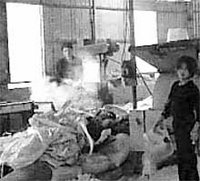• Challenge the Status Quo
• Recycling and Waste
• Sustainable Forests
----------------
The Draft Scoping Plan correctly identifies recycling and waste management as a focus area for mitigation of greenhouse gases. According to CARB's own estimates, there are 40 million tons of unrecycled waste pouring into California's landfills each year. This is roughly equal to the amount that was accumulating before California's very successful recycling policies were enacted twenty years ago.
 The California Integrated Waste Management Board (CIWMB) needs to pursue a more aggressive approach than merely extending methane capture and composting solutions. California's waste management companies already lead the nation in their efficiency for capturing methane from landfills. The closure of landfills, not methane capture, is the urgent problem that requires attention.
The California Integrated Waste Management Board (CIWMB) needs to pursue a more aggressive approach than merely extending methane capture and composting solutions. California's waste management companies already lead the nation in their efficiency for capturing methane from landfills. The closure of landfills, not methane capture, is the urgent problem that requires attention.Composting is not a solution for two reasons: 1) the resulting compost does not meet a consistent purity standard to make it marketable and 2) the demand for compost is so low that these programs are not economically sustainable.
Environmental sustainability will only come with economic sustainability. For this reason Zero waste as currently defined by some recycling groups is an unattainable idealistic vision for which the costs will grow geometrically as it approaches zero percent. The biggest reduction in the rate of landfilling will come if clean conversion technologies, which are economically sustainable, are developed as an extension of recycling.
Most unrecyclable trash can be used for generating renewable electricity or converting into carbon-neutral biofuels. Some of our biggest landfills in our largest cities are scheduled to close within the next decade necessitating trans-shipment to other sites - sometimes hundreds of miles away. This is a waste of GHG emitting trucking and rail energy (see independent 2005 UC/Riverside analysis). Instead, conversion technologies sited at waste sorting facilities, a plan already under development in Los Angeles, can cleanly reduce the volume going to landfills by approximately 85%.
Without question, municipalities should receive diversion credit for redirecting unrecycleable biomass from landfills to conversion technologies that can cleanly produce bioenergy and bioproducts from the refuse.
 I personally believe there should be a recycling integrity clause in the Scoping Plan that insures that all recycled waste is turned into products within California to reduce and control global GHG emissions. That is the only way that the hard choices about waste stream recycling, greenhouse gas emissions, and economic sustainability can be honestly addressed. Currently most recyclables are shipped to China (at great GHG expense) because of that country's poor wages, lack of workers rights, and appallingly low pollution standards.
I personally believe there should be a recycling integrity clause in the Scoping Plan that insures that all recycled waste is turned into products within California to reduce and control global GHG emissions. That is the only way that the hard choices about waste stream recycling, greenhouse gas emissions, and economic sustainability can be honestly addressed. Currently most recyclables are shipped to China (at great GHG expense) because of that country's poor wages, lack of workers rights, and appallingly low pollution standards.----------------
technorati bioenergy, biofuels, waste, landfill, legislation, California


No comments:
Post a Comment